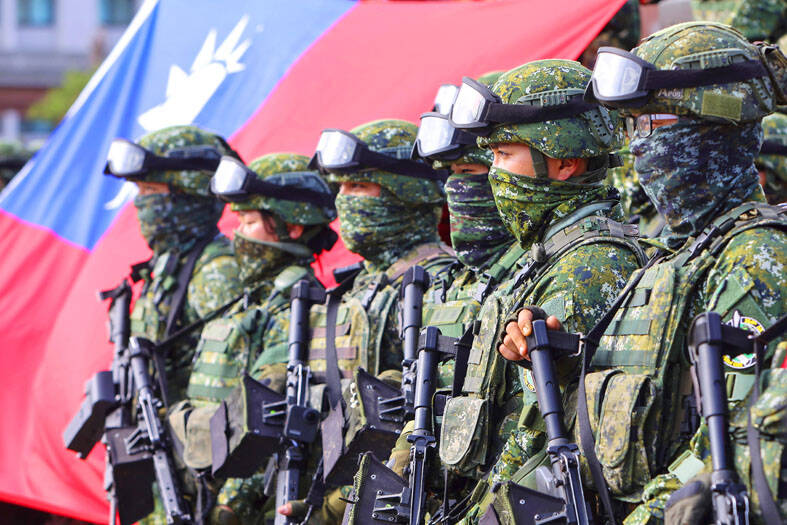The number of conscripts reporting for one-year military service is set to grow to about 53,600 by 2029, while the budget for military personnel would likely increase by NT$16 billion (US$522.41 million) by then, the Ministry of National Defense (MND) said in a written report to the Legislative Yuan.
President Tsai Ing-wen (蔡英文) on Dec. 27 announced that compulsory military service would be extended from four months to one year as part of efforts to bolster the nation’s combat readiness in the event of a Chinese attack. The change in policy affects all men born after Jan. 1, 2005, starting from Jan. 1 next year.
Minister of National Defense Chiu Kuo-cheng (邱國正) is to brief lawmakers about the details of the plan in a meeting of the Legislative Yuan’s Foreign and National Defense Committee today.

Photo: Daniel Ceng, AP
Although 78,600 conscripts would be drafted next year, only about 9,100 are expected to report for the one-year military service, as most high-school graduates tend to postpone their service until after college, the ministry said.
The remaining 69,500 conscripts would undergo four months of military training, it said.
The number of conscripts undergoing one-year military service would gradually increase to 53,600 by 2029, while the number taking part in the four-month training would gradually decrease to 9,300, the ministry said.
Conscripts would mostly supplement garrison troops, followed by main battle forces, it said.
To ensure that troops have enough leaders, the ministry said it would in 2027 begin offering an annual test to recruit college graduates to serve as professional army and non-commissioned officers.
As the monthly salary of a one-year conscript is to be raised to NT$26,307, the budget for military personnel costs is estimated to increase by NT$2 billion next year, it said.
Due to the annual increase of one-year conscripts, military personnel costs would rise by NT$16 billion by 2029.
Rifle training for conscripts is also to be adjusted.
Aside from being trained to shoot in a prone position, conscripts would be trained to shoot while standing and kneeling, as well as how to change shooting positions, it said.
They would learn to change magazines and troubleshoot their rifles, the ministry said.
The ministry’s “Intensified Shooting Training Monthly Execution Plan” showed that military units are practicing shooting once a month until December, with each conscript allowed to shoot 50 rounds.
Conscripts are allowed to shoot 60 rounds during night-time combat training, which is conducted once per season, the ministry said, adding that they are allowed to shoot 100 rounds during annual shooting training at a military base.

CHAOS: Iranians took to the streets playing celebratory music after reports of Khamenei’s death on Saturday, while mourners also gathered in Tehran yesterday Iranian Supreme Leader Ayatollah Ali Khamenei was killed in a major attack on Iran launched by Israel and the US, throwing the future of the Islamic republic into doubt and raising the risk of regional instability. Iranian state television and the state-run IRNA news agency announced the 86-year-old’s death early yesterday. US President Donald Trump said it gave Iranians their “greatest chance” to “take back” their country. The announcements came after a joint US and Israeli aerial bombardment that targeted Iranian military and governmental sites. Trump said the “heavy and pinpoint bombing” would continue through the week or as long

TRUST: The KMT said it respected the US’ timing and considerations, and hoped it would continue to honor its commitments to helping Taiwan bolster its defenses and deterrence US President Donald Trump is delaying a multibillion-dollar arms sale to Taiwan to ensure his visit to Beijing is successful, a New York Times report said. The weapons sales package has stalled in the US Department of State, the report said, citing US officials it did not identify. The White House has told agencies not to push forward ahead of Trump’s meeting with Chinese President Xi Jinping (習近平), it said. The two last month held a phone call to discuss trade and geopolitical flashpoints ahead of the summit. Xi raised the Taiwan issue and urged the US to handle arms sales to

BIG SPENDERS: Foreign investors bought the most Taiwan equities since 2005, signaling confidence that an AI boom would continue to benefit chipmakers Taiwan Semiconductor Manufacturing Co’s (TSMC, 台積電) market capitalization swelled to US$2 trillion for the first time following a 4.25 percent rally in its American depositary receipts (ADR) overnight, putting the world’s biggest contract chipmaker sixth on the list of the world’s biggest companies by market capitalization, just behind Amazon.com Inc. The site CompaniesMarketcap.com ranked TSMC ahead of Saudi Aramco and Meta Platforms Inc. The Taiwanese company’s ADRs on Tuesday surged to US$385.75 on the New York Stock Exchange, as strong demand for artificial intelligence (AI) applications led to chip supply constraints and boost revenue growth to record-breaking levels. Each TSMC ADR represents

State-run CPC Corp, Taiwan (CPC, 台灣中油) yesterday said that it had confirmed on Saturday night with its liquefied natural gas (LNG) and crude oil suppliers that shipments are proceeding as scheduled and that domestic supplies remain unaffected. The CPC yesterday announced the gasoline and diesel prices will rise by NT$0.2 and NT$0.4 per liter, respectively, starting Monday, citing Middle East tensions and blizzards in the eastern United States. CPC also iterated it has been reducing the proportion of crude oil imports from the Middle East and diversifying its supply sources in the past few years in response to geopolitical risks, expanding